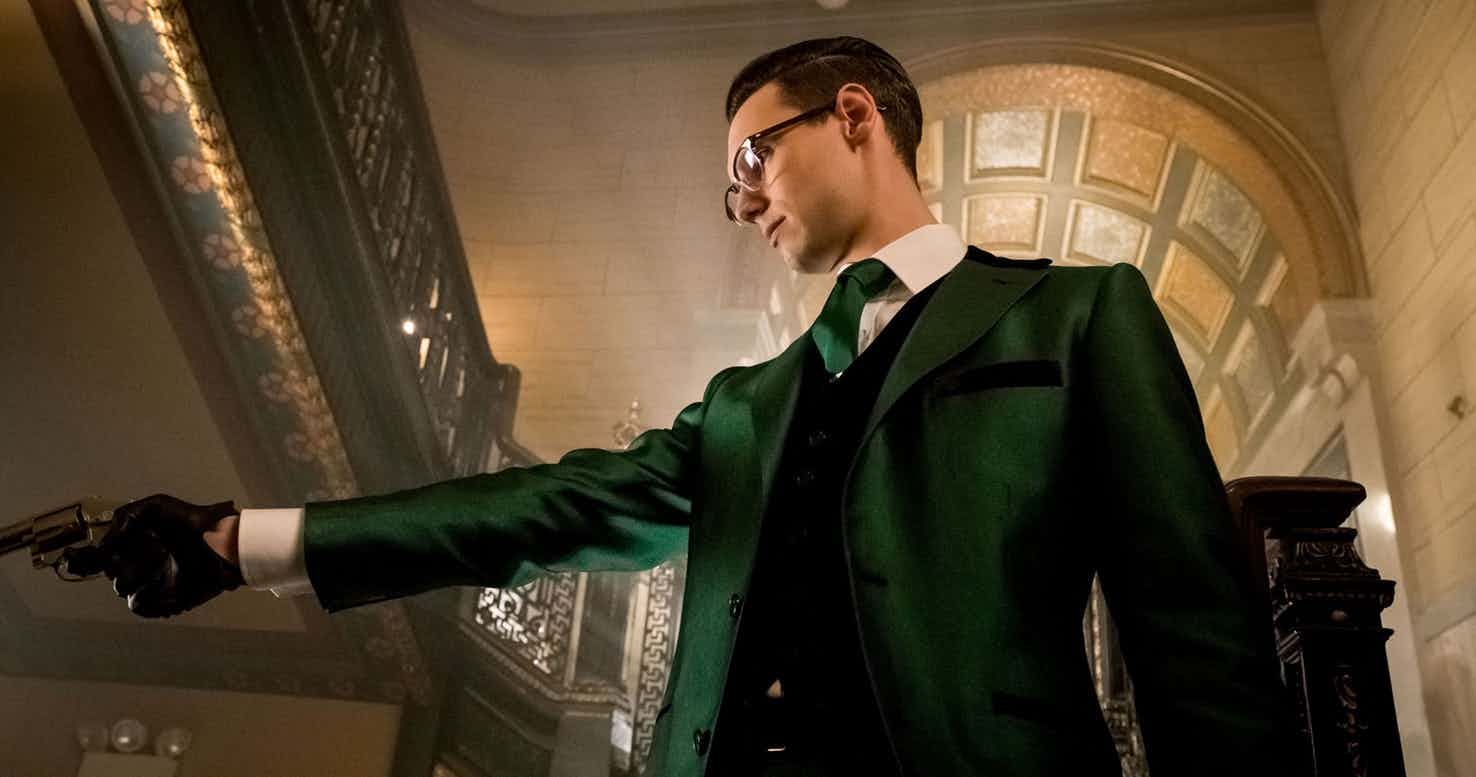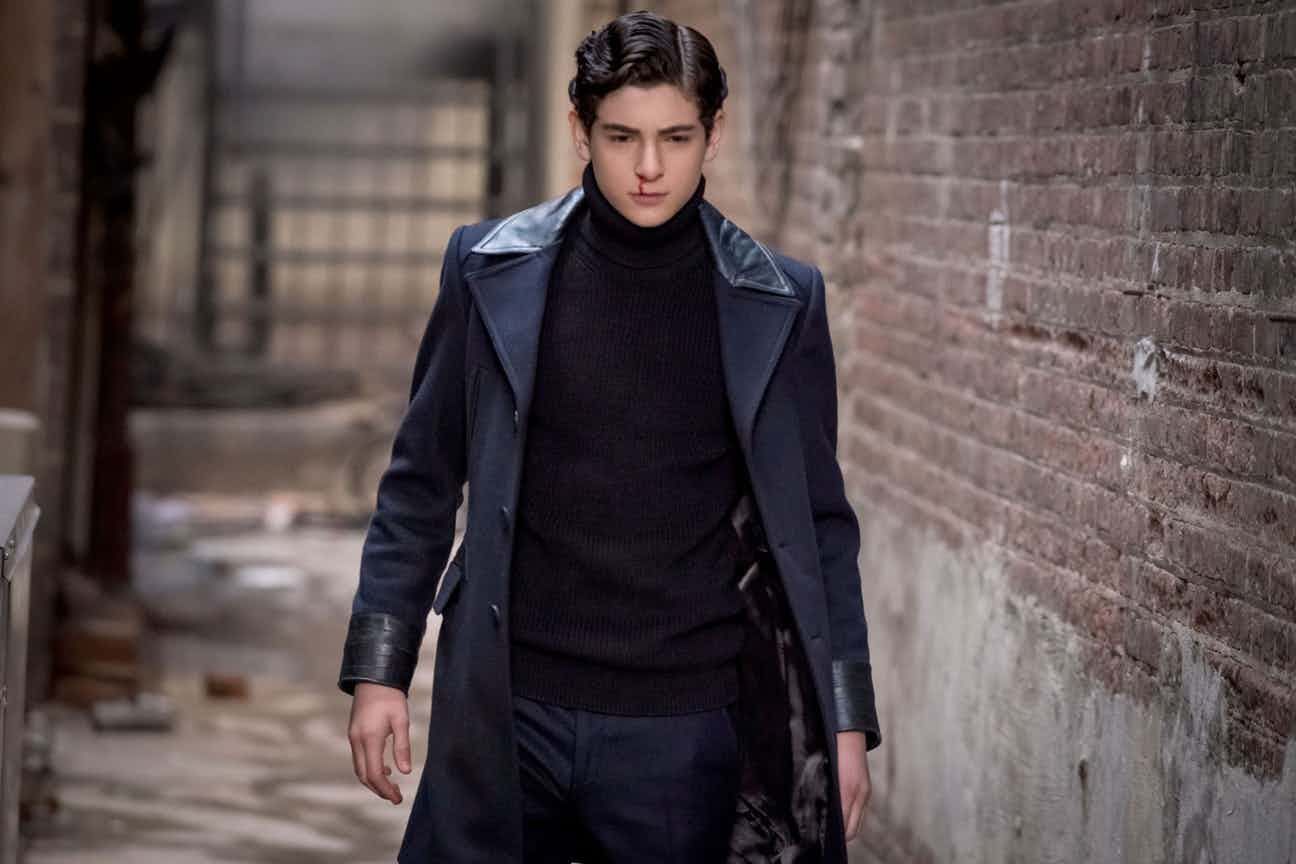One of the odder facets of modern network TV that takes its inspiration from comic books is the mini arc. Networks now hype their shows as having "Winter Premiers" with new banner names for whatever story arc is in the offing. As a promotional technique, it may work to goose a few added viewers out of a first episode (just like in comics), but rarely does the practice deliver on resetting the creative content of a series in any real way.
Fox's pre-Batman drama "Gotham" has leaned harder into this practice than any superhero show (with the possible exception of Marvel's "Agents of S.H.I.E.L.D."). And while each new arc brings the thrill of a different bad guy or a strange status quo shift, rarely do these named storylines improve the core of the show in any way. That's certainly the case with the launch of the show's "Rise of the Heroes" era last night – the somewhat ironically titled "How the Riddler Got His Name." That is to say, while the overarching branding points towards heroes like Jim Gordon and Bruce Wayne finally coming into their own (as well as a possible bookend for the show still seeking its fourth season pickup), the episode is still mired in the gruesome yet toothless machinations of its villains.
The focal point of this hour (and likely the rest of the season) is Ed Nygma – a man insisting he knows who he is even as he's tripping balls and changing his name. After supposedly killing his frienemy the Penguin at the end of last season (supposedly because...come on), Ed is popping hallucinogenic pills and seeing dear, departed Oswald everywhere as he launches a scheme to find a new suitable foil for his deranged riddling ways. After killing a spate of professors and artists who fail to live up to his intellectual standards (i.e., solving childish riddles at gunpoint), our man lands on the scheme to draft Jim Gordon of the GCPD as his new arch nemesis.
Too bad that Jim is on leave with his equally flat affected uncle. In between sipping scotch and not shooting deer, the pair clash over the legacy of Jim's departed father. His uncle reveals that both brothers were a part of Gotham's shadowy Court of Owls, but Jim's dad was murdered by the secret society after going rogue. Now 20 years later, the Court wants to tap Jim as a member, but uncle has other plans: an internal takedown of the whole shebang. The thrust of this B-plot is meant to hinge on the idea of who's the uncle lying to: Jim or the Court? But with boilerplate dialogue and leaden delivery, the audience might be wondering instead how they've stayed awake.
Back on the path to excitement, Nygma lands on former co-workers Lucius Fox and Harvey Bullock as stand-in foes. The pair pin the mystery killer of academics to a candy-gram-like riddle delivered to Jim and as a result foil public prank the fiend sets up at a high class chess tournament. Why Nygma went from killing people in cold blood to zapping them with joy buzzards and then back again is a mystery perhaps no one can answer, but the whole chase comes to a head when he Nygma both poisons a graduating class of police cadets and kidnaps Harvey, stringing him up for a fall to the death with the poison antidote around his neck. Only Lucius solving one of Ed's three riddles can save the score of cops from death. Fox does it after divining both a psychological thread between the answers (loneliness, an individual and a reflection all pointing to the birth of Ed's new persona) and the fact that it was Nygma who murdered the Penguin. Saving the day here may be the most consequential moment of Lucius' career on the show after a long string of promising setups as the answer man.
But even as this story plays out both with a few comical twists (Harvey leaning into the role of well-to-do Captain while Lucius fumbles through his part as a detective is charming enough), for the most part this is rote "Gotham." The occasional swells of creepy Elfman-esque music and well-composed shots of the grey, gruesome city can't make up for a multitude of plot holes and overkill dynamics. Nygma's growing Riddle is meant to be a force of evil, but it's hard to land that feeling when the viewer knows that the only real threats are levied at expendable character actors with no personality. Meanwhile, why exactly is he going full-on public as a murderer instead of wearing a mask? All the conversations with "Head Oswald" can't make sense of Nygma's scheme, let alone the bizarre yet meaningless song-and-dance number the faux-Penguin does. All of this is probably meant to impress the isolation and increasing insanity that Nygma is in, but stressing out his voice to a raspy shout and squeezing the bridge of his nose a lot is a far cry from actor Cory Michael Smith (recently a bright spot in the cast) really plumbing the depths of this villain.
A similar weak streak arrives with Bruce Wayne's storyline. When he receives a mystery message from Selina Kyle that he initially plans on ignoring, it seems for once that Bruce has grown a spine alongside his growing plan to become a master crimefighter. But after Alfred urges him to find closure with his criminal girlfriend, Bruce is shot down and left to duke it out with some Middle School dropout named Sonny and his gang of street trash. As per usual, "Gotham" frames the fight with some style – casting Bruce as a Batman-like silhouette for the showdown. But how exactly he's gotten good enough lately to take on four kids with some standard punches and win doesn't add up. The whole fight is toothless and inexplicable – just place-setting for Bruce to get where the show needs him to go.
In the end, the episode holds tight to its two biggest statements of purpose. On the one hand, Nygma pops up in Lucius' car to explain (what little he had of) his masterplan and declare himself the Riddler. On the other, the clone Bruce trained up by the Court of Owls reveals himself the author of the Selina note before he kidnaps real deal out with the most gigglingly stupid explanation of "a knock out agent" the show could cook up. Both as Riddler pours his hallucinatory drugs in the river and as faux-Bruce clobbers his mirror, the villains declare themselves whole. "I know who I am," Riddler says before assuring the dying Head Oswald that while the city isn't afraid of him yet "they will be." And fake Bruce taunts "This is what I was made for" as the world melts away.
The intent here is crystal clear: the villains have finally come into their own, so the heroes better step up. With final tags hinting that the real Oswald is back and teaming with Poison Ivy or that Bruce is now trapped in a mountain prison on the other side of the globe, the shit is hitting the fan left and right. In a more confident, competent show, this setup would be an exciting launch into a climactic final battle. But in "Gotham," it's just more of the same with a slightly different name flashed during the commercial break.


